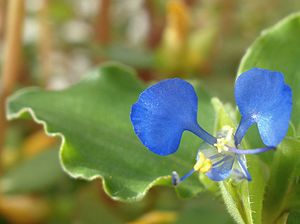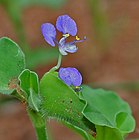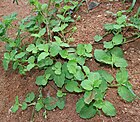Note: This is a project under development. The articles on this wiki are just being initiated and broadly incomplete. You can Help creating new pages.
Difference between revisions of "Commelina benghalensis"
(→Mode of Propagation) |
|||
| Line 48: | Line 48: | ||
==Mode of Propagation== | ==Mode of Propagation== | ||
| − | {{Propagation|Stem cuttings}}, {{Propagation| | + | {{Propagation|Stem cuttings}}, {{Propagation|Root cuttings}}, {{Propagation|Seeds}}. |
==How to plant/cultivate== | ==How to plant/cultivate== | ||
Revision as of 18:02, 17 April 2020
Commelina benghalensis is a herbaceous perennial plant. The plant can become annual in areas with colder winters or long dry seasons.
Contents
- 1 Uses
- 2 Parts Used
- 3 Chemical Composition
- 4 Common names
- 5 Properties
- 6 Habit
- 7 Identification
- 8 List of Ayurvedic medicine in which the herb is used
- 9 Where to get the saplings
- 10 Mode of Propagation
- 11 How to plant/cultivate
- 12 Commonly seen growing in areas
- 13 Photo Gallery
- 14 References
- 15 External Links
Uses
Eye ailments, Sore throat, Burns, Sorefeet, Diarrhoea.
Parts Used
Chemical Composition
Common names
| Language | Common name |
|---|---|
| Kannada | |
| Hindi | |
| Malayalam | |
| Tamil | |
| Telugu | |
| Marathi | |
| Gujarathi | |
| Punjabi | |
| Kashmiri | |
| Sanskrit | |
| English |
Properties
Reference: Dravya - Substance, Rasa - Taste, Guna - Qualities, Veerya - Potency, Vipaka - Post-digesion effect, Karma - Pharmacological activity, Prabhava - Therepeutics.
Dravya
Rasa
Guna
Veerya
Vipaka
Karma
Prabhava
Habit
Identification
Leaf
| Kind | Shape | Feature |
|---|---|---|
Flower
| Type | Size | Color and composition | Stamen | More information |
|---|---|---|---|---|
| {{{5}}} |
Fruit
| Type | Size | Mass | Appearance | Seeds | More information |
|---|---|---|---|---|---|
Other features
List of Ayurvedic medicine in which the herb is used
Where to get the saplings
Mode of Propagation
Stem cuttings, Root cuttings, Seeds.
How to plant/cultivate
A plant of warm temperate to tropical areas where it can be found at elevations up to 1,600 metres.[3]
Commonly seen growing in areas
Common in disturbed areas, At forest edges, Home gardens, Secondary regrowth.
Photo Gallery
References
- ↑ [Chemistry]
- ↑ [Morphology]
- ↑ Cultivation
Cite error: <ref> tag with name "Uses" defined in <references> is not used in prior text.
External Links
- Pages with reference errors
- Ayurvedic Herbs known to be helpful to treat Eye ailments
- Ayurvedic Herbs known to be helpful to treat Sore throat
- Ayurvedic Herbs known to be helpful to treat Burns
- Ayurvedic Herbs known to be helpful to treat Sorefeet
- Ayurvedic Herbs known to be helpful to treat Diarrhoea
- Herbs with Leaves used in medicine
- Habit - Perennial
- Index of Plants which can be propagated by Stem cuttings
- Index of Plants which can be propagated by Root cuttings
- Index of Plants which can be propagated by Seeds
- Herbs that are commonly seen in the region of Common in disturbed areas
- Herbs that are commonly seen in the region of At forest edges
- Herbs that are commonly seen in the region of Home gardens
- Herbs that are commonly seen in the region of Secondary regrowth
- Herbs
- Pages without herbs images







